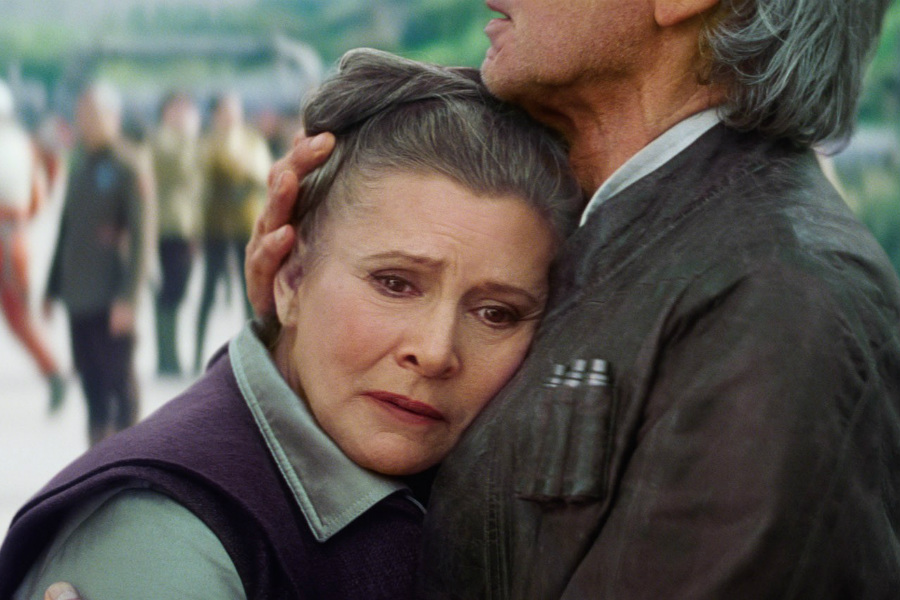Barbershop: 2016 Is Almost Over, But Was It Really The Worst?
NPR’s breaking news reporter Nate Rott, former political reporter Sam Sanders and senior business editor Marilyn Geewax talk about what happened in news during 2016.
MICHEL MARTIN, BYLINE: Now it’s time for the Barbershop. That’s where we get a group of interesting folks together and ask what’s in the news and what’s on their minds. For our final Barbershop of 2016, we decided we wanted to talk about some of the biggest stories in the news in 2016, so we turn to our own folks for this.
In for a shape-up today as Nate Rott. He covers breaking news all over the country from his base at NPR West. Hi, Nate.
NATHAN ROTT, BYLINE: Hey.
MARTIN: And here in Washington, D.C., is Sam Sanders, who was all over the country covering the 2016 elections.
SAM SANDERS, BYLINE: Hey there.
MARTIN: Hey. And also back with us – NPR senior business editor Marilyn Geewax. Marilyn, good to see you, too. Thank you for coming.
MARILYN GEEWAX, BYLINE: Hi, Michel. I’m glad to be here.
MARTIN: OK, so let’s start with the big question – at least the big question on social media. Was 2016 the worst ever (laughter)? It’s actually become its own meme on Twitter. People are posting pictures of things like burning dumpster fires and…
SANDERS: (Laughter).
MARTIN: …You know – and of course the many celebrities who’ve passed away. And you know what? One of my favorite comic strips actually had this as a storyline. One of the characters actually said, I just want 2016 to be over, to which I was, like…
SANDERS: Yeah.
MARTIN: …Really – “Judge Parker” – really?
(LAUGHTER)
MARTIN: So Sam, you wrote about this. So you know…
SANDERS: I wrote about 1,100 words on this very question…
MARTIN: Yeah. Tell me about this.
SANDERS: …Because I’m guilty of this, too. Like, for the last six months, I have been saying and tweeting, oh, my goodness – 2016 – this year is crazy. By some measures, it’s not that bad. And Marilyn can speak to this. But I wanted to ask the question, why is everyone going online, saying that this year is the worst?
MARTIN: Or maybe phrase it another way. Why is everyone online saying…
SANDERS: Yes.
ROTT: (Laughter).
MARTIN: …This is the worst year…
SANDERS: Yeah.
MARTIN: …Ever.
SANDERS: So I talked to…
MARTIN: So what did – yeah, tell me what you found out.
ROTT: I talked to a few smart thinkers, and I spoke with Nikki Usher at George Washington University, and she said we have experienced the kind of climax of what she calls ambient journalism. So when you consume media and social media and journalism on your smartphone, on your device, it’s always on you. It’s buzzing you. It’s in your face, and you’re constantly harassed by these negative headlines. And that makes things feel a lot worse than they really are.
And on top of that, this was a year where there was no part of the culture that offered something else. Usually pop culture is full of happy stories that get away from politics. But this year, think about it. Your favorite pop star probably endorsed a candidate for president. The NFL was taken over by silent protest. The biggest film of this year, “Captain America: Civil War,” was all about the modern security state. You just couldn’t escape this negativity. And I think that’s a part of it.
MARTIN: OK. Marilyn, what’s your take on this?
GEEWAX: I am just amazed at the impact that social media has had. When I think about where we were in December of 2008, that was bad. 2009, we had, like, 10 percent unemployment. Now it’s 4.6. We’ve been having low fuel prices, cheaper food. Inflation has been under control. Mortgages have been really cheap for the most part. Home prices are rising. There are five-and-a-half million job openings right now. Corporate profits are up. The stock prices are up. Someday there will be a meme called, 2016 – the good old days, you know?
(LAUGHTER)
SANDERS: Are you sure about that?
GEEWAX: You know, like, we’re going to look back on this and…
MARTIN: Well, here’s a…
GEEWAX: Say, wow…
MARTIN: Well, here’s the…
GEEWAX: …That was great.
MARTIN: But here’s the hard question. Is this part of it – is it the celebrity deaths in part, or is it the election…
GEEWAX: I think…
MARTIN: …Which was so ugly. I mean…
GEEWAX: Yeah. I – to me…
MARTIN: Is it partly that?
GEEWAX: You know, to me, it was just – the election – the whole energy of it was so negative – people tearing each other down, calling each other names. You know, just – gosh, it was really negative and nasty compared with – in 2008, there was more of a sense of, this actually is a bad year; we need to pull together and do the best we can.
MARTIN: Interesting. Nate, what do you think?
ROTT: You know, no, it wasn’t the years – worst year ever. I mean we could all hope that it’s the worst year ever because that means 2017, like – things are looking up, right? I tried taking a positive tact on this because I do think that, you know, you are what you eat, right?
So, like, I think if we look at all this negative news, you consume all this negative news, I mean, yeah, the world looks pretty bleak and terrible. So I was trying to pick my brain earlier and think of things that were really good this year.
And I think objectively, we can say it was a great year for sports. The Cubs won the World Series. They broke their curse. That was pretty exciting. LeBron James fulfilled his prophecy and brought a championship…
MARTIN: Yay.
SANDERS: Oh, OK.
ROTT: …to Cleveland. You don’t sound so excited, Sam.
SANDERS: I don’t.
(LAUGHTER)
GEEWAX: I loved it, said…
MARTIN: Sam, it’s OK.
GEEWAX: …The Buckeye.
SANDERS: (Laughter).
MARTIN: That’s all right.
ROTT: I am a unhealthy Denver Broncos fan, and we won the Super Bowl, so that’s really good. So I mean I think there were – everything’s relative, right? I think for some people, it was, yeah, a really, really, really bad year. For some people, it wasn’t so bad. And it’s important to remember that.
MARTIN: And for Trump supporters, it was a great year.
SANDERS: It was a great year.
MARTIN: I mean one of our guests – one of our earlier Barbershop guests earlier in the year was saying, look; now we get a chance to see our ideas in practice. But moving on from that, let’s just – all right, you know, we were looking at a lot of the lists that were together by lots of news organizations about, like, the biggest stories of 2016. And it was interesting, Nate, going back to your point, about kind of where you stand depends on where you sit…
ROTT: Right.
MARTIN: …Or what you focus on yourself. So let me just start with you on that. What’s your take on the biggest and most important story in 2016?
ROTT: Well, I mean it’s hard to argue that the election wasn’t the biggest story of 2016. I was trying to think of some stories that we’re going to think about in, like, 10 years, right? We’re going to look back and say, oh, 2016 – that happened.
And I think a story that didn’t get a ton of play, was kind of overwrought with all the other stuff during the election – but cannabis, marijuana – now 1 in 5 Americans live in a state where recreational pot is legal for adults. And people that I’ve talked to in the cannabis industry say it’s a game changer. It’s a turning point, a tipping point, whatever you want to call it there. And I do think that that is something that we are going to be talking about going forward.
One other thing that I know is not sexy – I’m stepping out on a limb here. But public lands, land-use issues are near and dear to my heart, and they’re a big thing out here in the West. And they don’t usually get that much attention because they just really aren’t that interesting. It’s kind of boring and complicated.
And people on the East Coast don’t really understand it as much just because public lands aren’t as big of an issue there, but they’ve been in the news a ton this year, and those are big things I think we need to talk about if you’re looking at this urban-rural divide and what what’s important to people in different parts of the country.
MARTIN: Interesting idea. Marilyn, you want to jump in on this? What’s your idea of the…
GEEWAX: Yeah.
MARTIN: What do you think is the biggest story of 2016?
GEEWAX: You know, what was a big story seemed…
MARTIN: And it could be something you covered. I mean don’t be modest.
GEEWAX: Well, it seemed small in a way, and yet it was a huge story. The Carrier plant where the people got laid off – it’s a good example of why things – negative news gets amplified. And I named all those things that were great about the economy. Stocks are up and this and that. There are all these good things that happened.
But when you watch that video that somebody made with the little handheld smartphone, you get this video of people being told their lives are being shattered. You’re going to lose your job, and the way that guy did it was so cold. It was like, and we’re going to move, and you’re going to lose your job and blah, blah, blah. And these people – you could just hear this gasp of people saying, oh, my God. You know, your life is about to fall apart, and this guy’s just rattling on.
So that ability to take something that was a relatively small story but amplified across social media made people feel like 2016 was a lot worse than it was. I think that Carrier story really had an impact on the election and an impact on how we thought about trade deals, how it helped kill off the Trans-Pacific Partnership deal. Those – that story reverberated in interesting ways.
MARTIN: Sam, what about you?
SANDERS: Yeah, I mean I think the default for someone who covers politics like me would be to say the story of the year was the election or Donald Trump or Russia. But I want to peel back those top layers and argue that the real story of this year was America’s changing consumption of news and media…
MARTIN: Yeah.
SANDERS: …And how that is shaping everything that’s going on right now. It definitely shaped this election. I mean think about it. We have seen this new economy where people are consuming the news not from an NPR website or a Washington Post website but from their social media feeds. They are feed first, social media first.
We’ve seen the rise of fake news. We’ve seen the rise of fake interaction in spaces like Twitter with all these bots doing God knows what. And so we’ve seen people more plugged in and more free to access all this information. But all of this freedom seems to have made us more divided.
And my question going forward for the next year is, like, what do we as journalists do to fix that problem? We have to ask ourselves every day, are we helping (laughter) ’cause, like, that needs to be fixed, and I’m not sure how.
MARTIN: And that is not a bad question to ask.
SANDERS: (Laughter) No.
MARTIN: I mean if you start out every day saying, what can I do to be constructive…
SANDERS: Yeah.
MARTIN: That – that’s – to me, that’s not a bad way to start the day.
SANDERS: It’s not.
MARTIN: So…
SANDERS: I mean because we’ve spent this whole year with everyone kind of just yelling for a year.
MARTIN: Well, that kind of leads really nicely into my last question for just resolutions of – New Year’s resolutions – so corny, but we all do it. I mean we all make them. So I wanted to ask.
SANDERS: Yeah.
MARTIN: Do you have any? Do you want to start, Marilyn?
GEEWAX: Wow, resolution – I want to just seriously continue to focus on context for things that – ’cause I think that’s what’s missing in this social media environment where people see things. Some bad thing happens, and it gets really blown out of context. You know, that we don’t – we need to step back. We need to be able to, as journalists, as Americans, as citizens, as voters – to look a little bit, to calm down and look at the big picture. That’s just my goal as a journalist – is to keep things in proportion and to keep things level-headed.
MARTIN: Nate, what about you?
ROTT: Disconnect – I want to disconnect more. I know it’s a hard thing to do sometimes with our job, but I think the importance of just getting away from your Twitter feed and the whole just waterfall of information and news and this and that and just, yeah, hang out, take a deep breath, talk to somebody face-to-face – I think those are things that I’m going to try to do a lot more of in the next year.
MARTIN: Sam, I’m giving you the last word.
SANDERS: I’ve been preaching this for the last year or so on the Politics Podcast. I think people should talk politics more with people in their lives in a constructive way. But what I’ve been hearing since the election is listeners right now saying, who are all these people on this other side that voted for that person? Who are they? Where are they? And it’s like, that’s your cousin. That’s the kid you went to high school with. That’s the person that bags your groceries. You just haven’t talked to them, and you don’t know what they’re seeing and thinking and feeling.
And so I urge people to talk about politics more but to listen and to engage not to persuade or to win but to learn. And I think so much of what we’ve seen in the aftermath of this election is people not actually knowing what their neighbors are doing or what they’re like or what they’re thinking. And that should change. And we can do that by talking about things like politics constructively.
MARTIN: Wow, OK – some good advice. I have a lot to think about.
SANDERS: (Laughter).
MARTIN: So thank you, all. Thank you, all. That is Sam Sanders. Nate Rott – he joined us from NPR West – here in Washington, D.C., Sam Sanders and Marilyn Geewax. Sam, Marilyn, Nate, thank you all so much for joining…
SANDERS: Thank you.
ROTT: Thank you.
GEEWAX: Thank you.
MARTIN: …Us for our very last Barbershop of 2016. And happy New Year to everyone.
SANDERS: Happy New Year.
ROTT: Happy New Year.
GEEWAX: Happy New Year to you all, too.
Copyright © 2016 NPR. All rights reserved. Visit our website terms of use and permissions pages at www.npr.org for further information.
NPR transcripts are created on a rush deadline by Verb8tm, Inc., an NPR contractor, and produced using a proprietary transcription process developed with NPR. This text may not be in its final form and may be updated or revised in the future. Accuracy and availability may vary. The authoritative record of NPR’s programming is the audio record.
This article passed through the Full-Text RSS service – if this is your content and you’re reading it on someone else’s site, please read the FAQ at fivefilters.org/content-only/faq.php#publishers.
Recommended article: The Guardian’s Summary of Julian Assange’s Interview Went Viral and Was Completely False.



